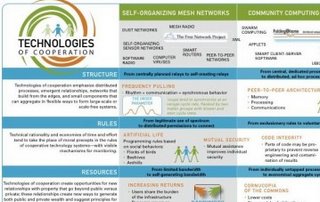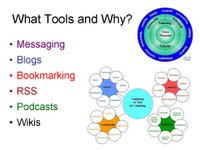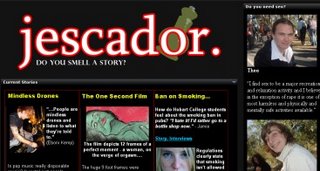Literacy of Cooperation

Just came across a great poster 'Technologies of Cooperation Map' outlining (defining?) Web 2.0 (without mentioning the word) on the Literacy of Cooperation resources page. Certainly gives a big picture!
Also some interesting videos and links on 'cooperative technologies', 'emergent democracy' and 'collective intelligence' including presentations looking at the creation of civic spaces and motivators for cooperation such as saving the world and love...
Link via Alex Steffan at WorldChanging
Labels: collaboration, communication, literacies
Flat Classrooms
I've been following
David Warlick's exploration of the concept of
Flat Classrooms.
Yesterday's post responded to a comment by
David Davies that asked.. "to what extent do you think students in the not-so-flat classroom are not curious, not self-directed, uncommunicative, etc?" David responded by saying that "there is nothing new here, that you haven't already heard..." but I'm not so sure...
I agree that there may be nothing new in the sense that we have talked about these issues before and that students have always been learners. BUT I don't think we have talked much about systemic solutions that address some of these issues by looking at our underlying values and assumptions. Educational provision has rarely been built on conversations between "student and teacher, learner and curriculum, classroom and the world" that David is asking for in the flat classroom.
And I don't think we are seeing much of the kind of curiosity, self-direction and communication that we as a nation (Australia) now require of students - particularly among the more traditionally "academically educated" students. Government, business, community and higher education - who are looking at the economic and social realities of living and woking in today's globalised technology rich world - are telling us that students:
- are good at following "recipes learned at school" that provide solutions to closed problems,
- are curious to learn more within known boundaries and
- can communicate what they know.
BUT
- they are not good at open-ended problems
- they ask few questions
- they don't know what they don't know - and are over confident about what they think they do know
- they don't collaborate very well
- they are not innovative - particularly outside disciplinary boundaries
I also think there is much more to explore using this "flatness" metaphor... We need to question how much students need to climb disciplinary ladders of knowledge and skills based on assumptions about developmental stages and academic hierarchies.
Students are often told that they have to "master the basics" before doing more interesting and contemporary things within a discipline and across disciplines. Unfortunately that process often takes 12 or more years and many (most?) don't stay in education long enough to be inspired by the genuine communities of practice/inquiry that dealing with today's knowledge and issues at the leading edge. We need some "flatness" here as well.
Of course some students can see this for themselves. They are some of the really self-directed learners who learn beyond the classroom walls. Here is how one science student described his learning to me:
"As far as my reading goes it's generally the Internet or magazines (national geographic and new scientist) or books like brief history of time and universe in a nutshell (illustrated edition - much easier to read than the original) I have NEVER had a good science teacher but that probably has more to do with me than them!
I would be one of those @#$#@ students - like in grade seven we had to name one of the 'three' states of matter and she mistakenly picked me and when I said plasma she rolled her eyes and sighed.
That's how I feel every time I'm forced to learn something wrong, even in year 11 & 12 (last year) they teach us the 'model atom' and you just think “wrong” - friction “wrong” - and do stuff with your friends [till it comes to exam time]. The best advice I got was play dumb – don’t give the right answer - give the answer according to what you've been 'taught'.
That's why I could not teach physics because I'd want to explain the quantum flux to the kindergarten kids. Instead I'm [leaving the state] so I can get into the cutting edge stuff…"
Labels: 21stCentury, assessment, collaboration, curriculum, engagement, global, learning, teaching
Blogs Away...

I received
Will Richardson's Blogs, Wikis, Podcasts... 2 days ago and found it to be such an informative and easy read that I'm ordering a few more to spread around campus.
In the meantime I've prepared an introduction for teachers - here are the slides (the narrated version is too big to link) showing how these Web 2.0 apps relate to our new curriculum. We have a whole staff session on these after Easter...
 I've linked each of the tools to our new Values, Purposes and curriculum organisers. Since the curriculum was designed to meet the needs of 21st century learners it's not surprising that many of the tools they are using easily link to the new curriculum.
I've linked each of the tools to our new Values, Purposes and curriculum organisers. Since the curriculum was designed to meet the needs of 21st century learners it's not surprising that many of the tools they are using easily link to the new curriculum.
On my school blog I've been experimenting with different kinds of posts modelling some things for students at the same time. This is the first year I have pushed blogs strongly with my classes - they can opt out but most are posting. For some, posting has come easily while others have moved tentatively from one word "Hi" to a sentence and more recently to paragraphs.
Some highlights have been students receiving international comment 5 mins after posting and one girl who danced excitedly around the room doing high-fives after she had 30 people read a poem she had posted. Evidence of higher order thinking and reflection in their blogs is still sparse but I'm optomistic I'll see more after the Easter break.
 Something that has worked well has been an online (campus-only) publication 'jescador' where my journalism class used our portal (MS Sharepoint) to glue together headers from stories posted in their blogs. In this way the publication went out as a whole while preserving the ability for readers to comment on individual stories and for the authors to keep a tally on the number of views for each story. Pretty neat.
Something that has worked well has been an online (campus-only) publication 'jescador' where my journalism class used our portal (MS Sharepoint) to glue together headers from stories posted in their blogs. In this way the publication went out as a whole while preserving the ability for readers to comment on individual stories and for the authors to keep a tally on the number of views for each story. Pretty neat.
Labels: collaboration, communication, ICT tools, learning
You never know who's listening... and learning...

A few days ago I 'virtually' attended a local meeting for technology educators called
MEGA at the
Friday Institute in North Carolina, USA. Physically I was in Tasmania, Australia. One aspect of today's so-called "
flat world".
David Warlick, a member of the group, was
blogging the meeting live with ongoing comments and pictures and I was commenting on his blog as he did so. He later wrote about this exchange in
another blog.
"Matt's presentation was followed by a fun session with Len Annetta, and his efforts to help teachers become video game developers. During the meeting, I was moblogging (mobile blogging), writing for about ten minutes in 2¢ Worth and then submitting, thanks to the facility's ubiquitous wireless access. About halfway into Len's presentation, I noticed that I had two comments on my blog. I pulled them up to discover an educator who had caught my ongoing commentary of the presentations in his aggregator. He was Googling some of the terms that I mentioned and included some of his insights about the term, stealth learning. As this exchange continued, he offering his AIM screen name so that we could strike up a chat during the presentation. I clicked the man's name to pull up his blog, holistic and integral education, and discovered that he was in Tasmania."
I found the experience fascinating - I actually felt I was there... whispering to someone in the back row. Many of my students would have loved to have been there to hear the speakers... As David says:
"I only just realized how much this exchange underscored the importance of the first presentation -- how important it is that we engage our students not only with highly interactive software, but engage them with the world that they are learning about, make them a part of the global conversation. The world is incredibly connected today, and we are still figuring out what that means. We're fairly sure, though, that in order to succeed and prosper, you are going to have to be part of that global conversation"
I left before the session finished - via a back door so I didn't disturb anyone - and re-emerged on the other side of our flatter world :-)
Labels: collaboration, communication, global, ICT tools

 I received
I received 
 Something that has worked well has been an online (campus-only) publication 'jescador' where my journalism class used our portal (
Something that has worked well has been an online (campus-only) publication 'jescador' where my journalism class used our portal (



